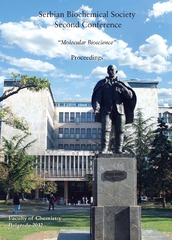| dc.creator | Božić, Nataša | |
| dc.date.accessioned | 2020-05-25T11:56:54Z | |
| dc.date.available | 2020-05-25T11:56:54Z | |
| dc.date.issued | 2012 | |
| dc.identifier.isbn | 978-86-7220-048-5 | |
| dc.identifier.uri | https://cer.ihtm.bg.ac.rs/handle/123456789/3571 | |
| dc.description.abstract | With efforts to reduce global reliance on fossil fuels and lower the greenhouse gas emission, an increasing search for renewably sourced materials, which can be used as feedstock for biofuel production, is ongoing in the past few decades. At the present, ethanol is the most common alternate fuel and is already produced on a fair scale, representing a sustainable substitute for gasoline in passenger cars. Basically, in the United States ethanol is produced by fermenting starch crops that have been converted into simple sugars, and the major feedstock for this fuel is corn. In Brazil ethanol is produced through the fermentation of sugar cane molasses. Various countries have been increasing their ethanol production as well, such as India (using sugar cane), Thailand (cassava), France (sugar beet), China (corn) and Canada (wheat), among others. Improved molecular disassembly and depolymerization of grain starch to glucose are key to reducing energy use in the bioconversion of glucose to chemicals, ingredients, and fuels. In fuel ethanol production, these biorefining steps use 10-20% of the energy content of the fuel ethanol. The need to minimize energy use and to raise the net yield of energy can be met by replacing high-temperature, liquid-phase, enzymatic digestion with low temperature, solid-phase, enzymatic digestion. Also called cold hydrolysis, the approach is a step toward a “green” method for the production of fuel ethanol. | en |
| dc.language.iso | en | sr |
| dc.publisher | Faculty of Chemistry, Serbian Biochemical Society | sr |
| dc.relation | info:eu-repo/grantAgreement/MESTD/Basic Research (BR or ON)/172048/RS// | sr |
| dc.relation | ICGEB research project grant number CRP/YUG11-02 | sr |
| dc.rights | openAccess | sr |
| dc.rights.uri | https://creativecommons.org/licenses/by-nc-nd/4.0/ | |
| dc.source | Serbian Biochemical Society Second Conference “Molecular Bioscience”, 9.11.2012. Belgrade, Serbia | sr |
| dc.title | Cold enzyme hydrolysis of starch | en |
| dc.type | conferenceObject | sr |
| dc.rights.license | BY-NC-ND | sr |
| dcterms.abstract | Божић, Наташа; | |
| dc.citation.spage | 49 | |
| dc.citation.epage | 59 | |
| dc.identifier.rcub | https://hdl.handle.net/21.15107/rcub_cer_3571 | |
| dc.identifier.fulltext | https://cer.ihtm.bg.ac.rs/bitstream/id/16593/bitstream_16593.pdf | |
| dc.type.version | publishedVersion | sr |


